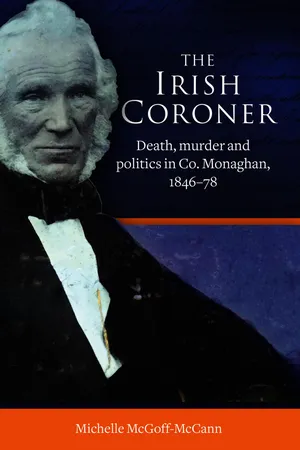
The Irish Coroner
Death, murder and politics in Co. Monaghan, 1846-78
- 255 pages
- English
- PDF
- Available on iOS & Android
About this book
Coroners who conducted inquests into sudden and suspicious deaths in nineteenth-century Ireland were viewed with disdain and disrespect in a society that was highly politicized and deeply divided. While the men who served in this role represented the authority of government and the need for social order and justice, it often put them at odds with the local elites, particularly when they were exposing corruption, social and moral failures, and sectarian murders. The Irish Coroner is an historical and social analysis of the coroner in pre-Famine, Famine and post-Famine Ireland and exposes a gap in Irish administrative history. William Charles Waddell served as coroner of north County Monaghan for over three decades. His detailed inquest reports, spanning over 31 years, not only chart the evolving role of the coroner in this crucial period in Irish history, they also highlight some of the social, economic and political contexts of the Famine crisis and the post-Famine decades in County Monaghan. Waddell' s inquests expose abuses of power and authority during a time when the county' s political life was controlled by a landowning, conservative elite. They helped to reveal to the public the injustice and corruption at the heart of county society. The book uses a unique set of coroners' inquests. It is an uninterrupted set of records over 31 years of an Irish coroner' s career. There is no other like it. The inquests frame the role of the coroner in death investigation and provide a more accurate account of the political and social conditions at the time death took place. They also reveal the politics in County Monaghan and tie the county into the wider national political landscape. The Irish Coroner offers, for the first time, the social importance of death investigation within local communities, particularly during the Great Famine. An original social history of County Monaghan during the Famine emerges. By aligning the legislation and local mismanagement of the crisis with Waddell' s work, the book exposes all factors that contributed towards those deaths. From the harsh reality of death by starvation to political murder, the inquests tell the story of a society that was politically polarised and places the coroner at the centre of the conflict.
Frequently asked questions
- Essential is ideal for learners and professionals who enjoy exploring a wide range of subjects. Access the Essential Library with 800,000+ trusted titles and best-sellers across business, personal growth, and the humanities. Includes unlimited reading time and Standard Read Aloud voice.
- Complete: Perfect for advanced learners and researchers needing full, unrestricted access. Unlock 1.4M+ books across hundreds of subjects, including academic and specialized titles. The Complete Plan also includes advanced features like Premium Read Aloud and Research Assistant.
Please note we cannot support devices running on iOS 13 and Android 7 or earlier. Learn more about using the app.
Information
Table of contents
- Cover
- Half Title Page
- Title Page
- Copyright Page
- Contents
- List of Illustrations
- List of Abbreviations
- Acknowledgments
- Introduction
- Part 1: Before the Famine
- 1. The reputation and authority of the coroners in nineteenth century Ireland
- 2. William Charles Waddell
- Part 2: During the Famine
- 3. The Famine and moral ambiguity
- 4. Managing and investigating pauper death
- Part 3: After the Famine
- 5. Public welfare and justice
- 6. The value of a life: the emergence of the modern Irish coroner
- Appendix 1: The coroners of Ireland (1871)
- Appendix 2: Inquests and inquiries in William Charles Waddell's casebooks
- Bibliography
- Index